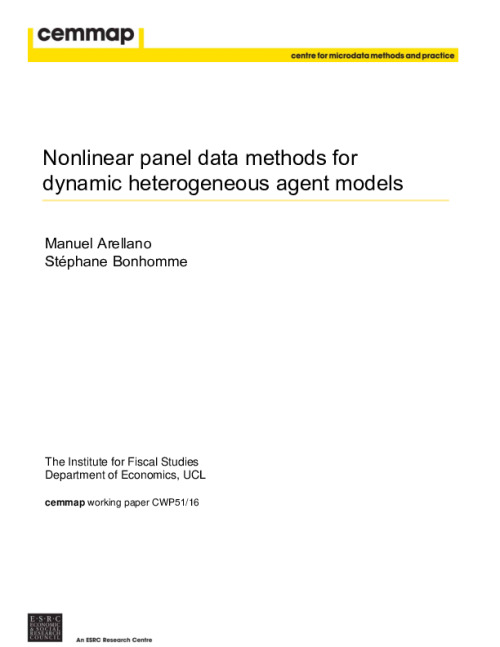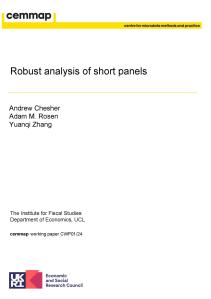Downloads

cwp511616.pdf
PDF | 396.19 KB
Recent developments in nonlinear panel data analysis allow identifying and estimating general dynamic systems. In this review we describe some results and techniques for nonparametric identifi cation and flexible estimation in the presence of time-invariant and time-varying latent variables. This opens the possibility to estimate nonlinear reduced forms in a large class of structural dynamic models with heterogeneous agents. We show how such reduced forms may be used to document policy-relevant derivative e ffects, and to improve the understanding and facilitate the implementation of structural models.
Authors

Research Fellow Centre for Monetary and Financial Studies (CEMFI)
Manuel is a Research Fellow of the IFS and a Professor of Econometrics at CEMFI, Madrid.

Professor of Economics University of Chicago
Working Paper details
- DOI
- 10.1920/wp.cem.2016.5116
- Publisher
- The IFS
Suggested citation
Arellano, M and Bonhomme, S. (2016). Nonlinear panel data methods for dynamic heterogeneous agent models. London: The IFS. Available at: https://ifs.org.uk/publications/nonlinear-panel-data-methods-dynamic-heterogeneous-agent-models (accessed: 3 May 2024).
More from IFS
Understand this issue

Gender norms, violence and adolescent girls’ trajectories: Evidence from India
24 October 2022

Empty defence spending promises are a shot in the dark
29 April 2024

Public investment: what you need to know
25 April 2024
Policy analysis

IFS Deputy Director Carl Emmerson appointed to the UK Statistics Authority Methodological Assurance Review Panel
14 April 2023

ABC of SV: Limited Information Likelihood Inference in Stochastic Volatility Jump-Diffusion Models
We develop novel methods for estimation and filtering of continuous-time models with stochastic volatility and jumps using so-called Approximate Bayesian Compu- tation which build likelihoods based on limited information.
12 August 2014

Is there really an NHS productivity crisis?
17 November 2023
Academic research

Sample composition and representativeness on Understanding Society
2 February 2024

Understanding Society: minimising selection biases in data collection using mobile apps
2 February 2024

Robust analysis of short panels
8 January 2024